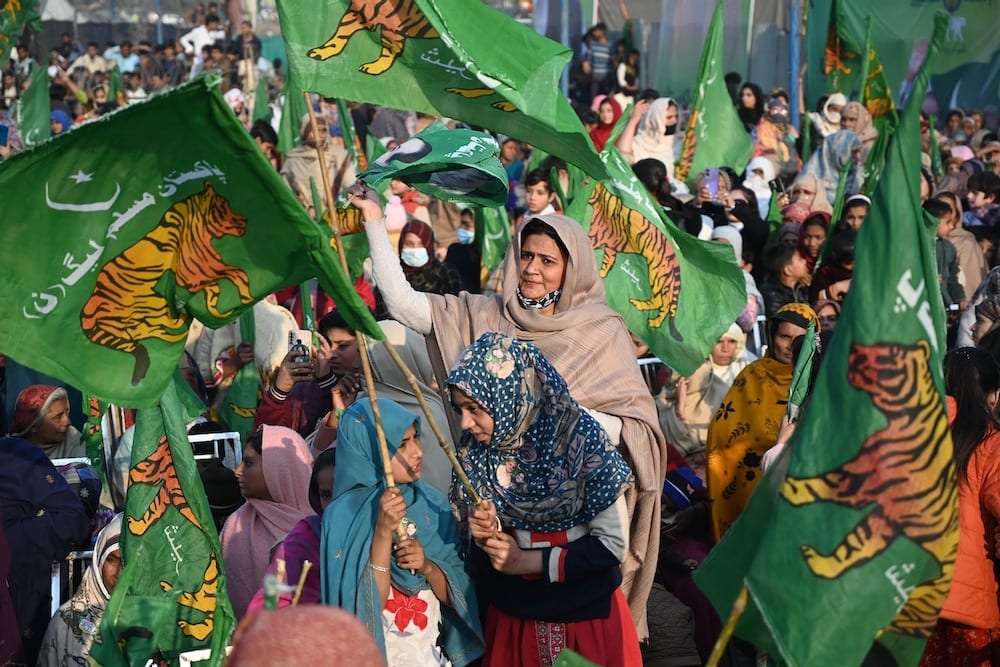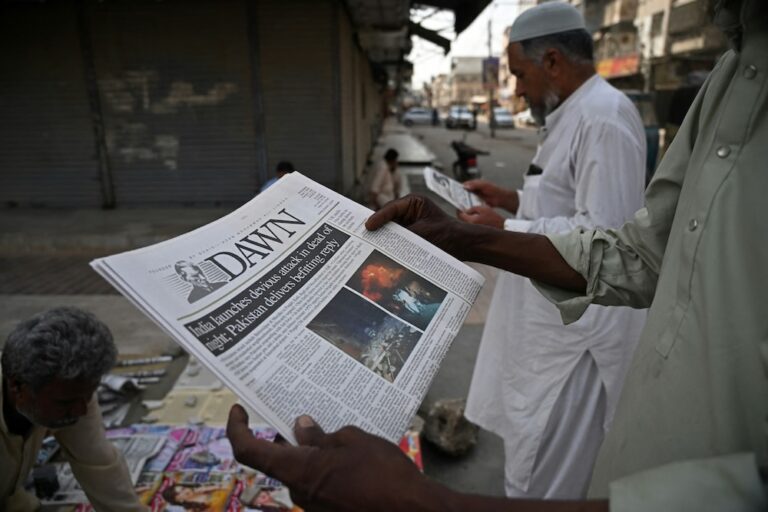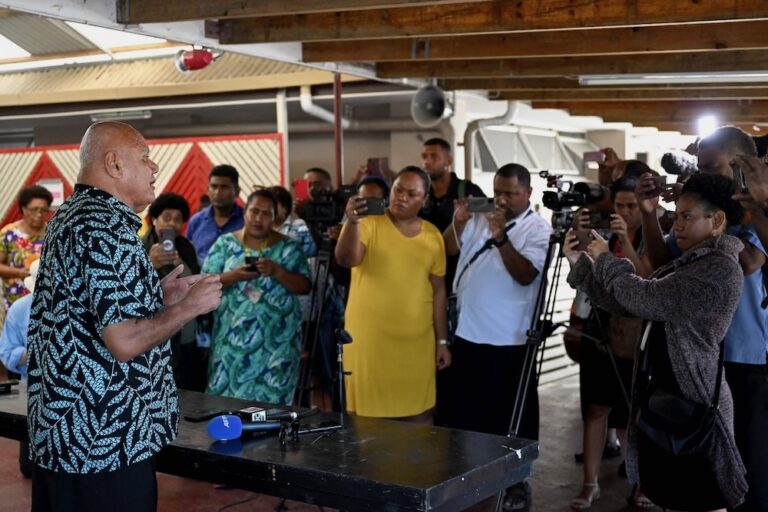January 2024 in Asia-Pacific: A free expression round up produced by IFEX's regional editor Mong Palatino, based on IFEX member reports and news from the region.
New media laws in India, Sri Lanka, and Nepal could negatively impact access to information. Afghanistan’s media situation remains precarious amid intensified state-backed attacks. Filmmakers in Myanmar and Malaysia face criminal charges. As political forces resort to restrictions and disinformation in Pakistan, media groups have initiated innovative ways to defend the people’s right to information.
New media laws under scrutiny
In India, the Telecommunications Act of 2023 was passed in December amid objections by civil society groups that it “enables indiscriminate surveillance, undermines encryption, and erodes privacy and safety online.” IFEX member SFLC.in warned that the new law “raises significant concerns regarding the dilution of procedural safeguards, potential infringements on privacy rights, and the broadening of governmental powers in the interception and suspension of telecommunication services.” It added that the law expanded the grounds for the government to suspend telecommunication services “without any substantive checks and balances.”
In Sri Lanka, the Online Safety Law took effect this month. The government claims it will help curb cybercrimes. However, critics point out that it will lead to the establishment of an Online Safety Commission with no independence from the executive. Under the law, this commission has broad powers to take down content and block access to accounts on “extremely vague and overbroad grounds”. Human rights groups have warned that it could enable “over-censorship” and “self-censorship”, which might affect public discourse ahead of the elections scheduled to take place later this year. It is worth noting that social media played an important role in the 2022 protests that led to a change in government.
In Nepal, several bills introduced in 2023 will be deliberated this year. These include the National Mass Communication Bill, Media Council Bill, Information Technology Bill, and Social Media Regulation and Management Bill. Freedom Forum executive chief Taranath Dahal wrote that “an informed and inclusive debate is essential” in tackling these measures:
“If freedom of expression and press freedom elude these laws and policies at federal and provincial levels, the foundation of democracy would be weakened.”
Afghanistan: From bad to worse
Afghanistan’s media situation continues to worsen under Taliban rule. In 2023, the Afghanistan Journalists Center (AFJC) documented at least 168 instances of press freedom violations, which included 61 arrests involving journalists. The group noted that journalists who ignored or disregarded the 14 media directives issued by authorities have faced punitive measures.
In the past month, attacks against the media have intensified. For example, the private Nan FM radio station was forced to shut down after it was raided by security forces.
Three journalists were briefly arrested. Ehsan Akbari. a reporter for Japan’s Kyodo news agency, was detained for nine days. Journalists Ahmad Jawad Rasooli and Abdulhaq Hamidi of Gardesh-e-Etilaat News Agency were arrested on 18 January and allowed to post bail two days later. Taliban officials have not disclosed the reasons for making these arbitrary arrests. In response, AFJC urged the government to stop the media crackdown:
“AFJC urgently calls upon the General Directorate of Intelligence to cease the mass arrests of journalists, which perpetuate fear and self-censorship within the journalism community and hinder the operation of media outlets.”
Meanwhile, the Acting Minister of Information and Culture of the Taliban issued a letter directing the media to refrain from using “foreign terms” in order to protect the country’s “national identity.” AFJC said this could prevent the media from using different languages to effectively deliver news content.
Media-related arrests, raids, and the imposition of restrictive guidelines reflect the worrying state of free speech in the country. This prompted Nai, an organization supporting open media in Afghanistan, to announce that it is temporarily suspending its operations “in light of the political situation and unfavorable conditions” in the country. AFJC described the decision as a “significant loss for the media community” since Nai has been providing training and legal assistance since 2005.
Artists and writers under attack
Myanmar documentary filmmaker Shin Daewe was sentenced to life in prison on trumped-up terrorism charges. This was the harshest sentence given to a journalist since the military seized power in February 2021. Shin Daewe was arrested in October 2023 after picking up a drone she ordered online. Reporters Without Borders said that the sentence showed the extent of the junta’s “arbitrariness and ruthlessness.”
Human rights groups are citing the blasphemy case of Malaysian creators of the film “Mentega Terbang” as an example of the “criminalisation of religious offence” to curtail freedom of expression and artistic freedom in the country. The film was released in 2021, but banned in September 2023 for allegedly insulting Islamic beliefs. IFEX member the Centre for Independent Journalism warned that “silencing or cancelling artistic freedom will only continue to breed a culture of fear.”
Uyghur writer and scholar Ilham Tohti marked his 10th year of detention in China. PEN International noted that his detention “is emblematic of the PRC government’s repression of the Uyghur and other ethnic groups in Xinjiang, which includes systematic efforts to dislocate the Uyghur population from their cultural identity.”
“Incredibly disturbing”: Actions taken against journalist spark outrage
In Australia, Lebanese Australian journalist Antoinette Lattouf was fired from her work at the Australian Broadcasting Corporation after she reposted on social media a Human Rights Watch video on the humanitarian situation in Gaza. IFEX member Media, Entertainment and Arts Alliance described the action of the broadcaster as “incredibly disturbing.”
Pakistan elections and free speech
In IFEX’s recent special New Year brief, which took a deep dive into the challenges, trends, and prospects related to freedom of expression and democracy the region is facing, we highlighted the efforts of Pakistan-based IFEX members to promote the people’s right to information during the election period.
As tensions intensify ahead of the elections slated for 8 February, Bytes for All and Pakistan Press Foundation expressed their concerns about recurring social media blocking, which often coincides with activities organized by the opposition.
Incidents related to internet shutdowns are among the data compiled in the Election Desk of the Digital Rights Foundation. The portal also documents harmful content pertaining to “hate speech, disinformation, gendered disinformation and technology facilitated gender-based violence.”
Aside from its training sessions and “Scrapathon” workshops, Media Matters for Democracy unveiled Facter, a tech-based investigation tool designed to be used by newsrooms. MMFD said it “streamlines the monitoring and fact-checking process for newsrooms by delivering a neatly organised, searchable database of suspect information, verified/published information, misinformation, and misleading information.”



